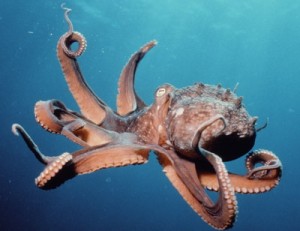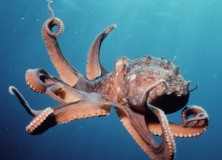 A few months ago, a documentary I saw on the Discovery Channel covered some research by Graziano Fiorito and colleagues at the Stazione Zoologica in Naples. They were investigating observational learning in wild Octopus vulgaris with a puzzle-box experiment similar to those demonstrating cultural transmission in chimpanzees.
A few months ago, a documentary I saw on the Discovery Channel covered some research by Graziano Fiorito and colleagues at the Stazione Zoologica in Naples. They were investigating observational learning in wild Octopus vulgaris with a puzzle-box experiment similar to those demonstrating cultural transmission in chimpanzees.
It goes like this: there’s a tasty and terrified crustacean running around in a perspex box that has two possible ways of being opened by hungry octopuses. The experimenters capture a wild octopus (let’s call him Steve) from the harbour (which I’ll get back to in a minute), and they put it in a tank with the puzzle-box. After Steve stares hopelessly at the box for a while, it is then removed from the tank. Steve the kidnapped octopus then gets to watch a captive octopus in the next tank being presented with the same puzzle-box containing the delicious crab. Of course, the captive octopus has been confronted with the puzzle-box enough times that it has worked out a successful solution, and so opens the box like a pro. Steve is then presented with a crab in a puzzle-box again, except this time he goes straight for the crab using the same solution he just learned from the captive octopus. Here is a clip from the documentary, showing a trial of this experiment (NB: not the best quality).
It turns out that the papers on this go back as far as Fiorito & Scotto 1992, and it seems this was the first time observational learning had been demonstrated in invertebrates. The reason I’m interested in reporting this is because the documentary I watched explained another possible motivation/interpretation for Fiorito’s work that I can’t find in any of his actual papers. The octopuses used in the experiments were all caught from the harbour at Naples just before the experiments, which of course controlled for any prior experience with the puzzle boxes. But the results were reported as particularly interesting because the Naples harbour had been overfished and disrupted, resulting in an increase in marine predators that eat the small octopus vulgaris as well as fish that the octopuses themselves rely on. These harsher environmental conditions resulted in the octopuses being forced to inhabit a smaller space alongside each other. As a result, young octopuses were frequently exposed to, and even coexisted with, older octopuses. This is a weird situation for an octopus; they usually live solitary lives and never even meet their own mothers, who die of starvation while caring for the eggs (the fathers die within a few months of having mated). The only real interactions are mating, and conflicts between rival males while competing for a mate.
Toward the end of the documentary, the voiceover growled against some dramatic music about how the combination of observational learning capacities and increased predation pushing octopuses into groups meant that it was only a matter of time before we’re overthrown by octopus vulgaris. This made me think of Dunbar’s “social brain hypothesis” for the emergence of language, and whether I really should prepare to welcome our new octopus overlords. Talking specifically about primates, Dunbar (1996) states that “[primates] in general exhibit two responses to increased predation: they grow physically bigger [or] they increase the size of their groups” (p.110). In order to maintain these groups, that are essential for survival in harsh ecological conditions, Dunbar suggests that standard primate grooming behaviour becomes too time consuming and costly in order to keep up with the rapidly expanding social group, creating a pressure for a more efficient method of bonding and communicating that allows the size of the group to continue increasing. Again with reference just to primate communication, Dunbar says “This [efficient mechanism] need not have involved any dramatic change, for as the studies by Seyfarth and Cheney have shown, primate vocalizations are already capable of conveying a great deal of social information and commentary.” (p.115) In addition to primates, and adding further credence to this idea, it’s been shown that the older Matriarchs of elephant groups make use of vocalisations to seemingly instruct their group on how to fend off lion attacks (McComb et al., 2011; previous Replicated Typo coverage here). It seems to me that the difference between the primates/elephants and the octopuses is that the former endeavour to actually enrich the environment from which their conspecifics extract information; they don’t just learn, they inform. As far as we can tell, there is no such communication like this – that is, enriching the environment in some way that helps other octopuses learn or survive – happening among the octopuses. That said, we know from mating displays and conflicts that cephalopods can communicate with chromatophore signalling. As an interesting aside that is reflective of their cognitive abilities and capacity for suffering, octopuses are treated as honorary vertebrates by UK animal testing laws.
It’s interesting enough that marine biologists (or at least those reporting on marine biologists) seem to have the same idea as Dunbar about the necessary preconditions for successful societies of animals, but why not let’s get wildly speculative? If (..!) existing in groups is in fact adaptive for these octopuses in the face of increased predation, and the competition between them for resources isn’t too great a counter-factor, it seems the only ingredient missing from an octopocalypse is the emergence of some cooperative behaviour. Someone should keep an eye on that harbour.
References
Dunbar, R. (1996) Grooming, Gossip, and the Evolution of Language. Harvard University Press: Cambridge, Massachusetts
Fiorito, G. & Scotto, P. (1992) “Observational learning in Octopus vulgaris” Science 256, 545-546.
McComb, K., Shannon, G., Durant, S., Sayialel, K., Slotow, R., Poole, J. & Moss, C. (2011) “Leadership in elephants: the adaptive value of age” Proceedings of the Royal Society B, published online.


1 thought on “Observational learning in octopus vulgaris”